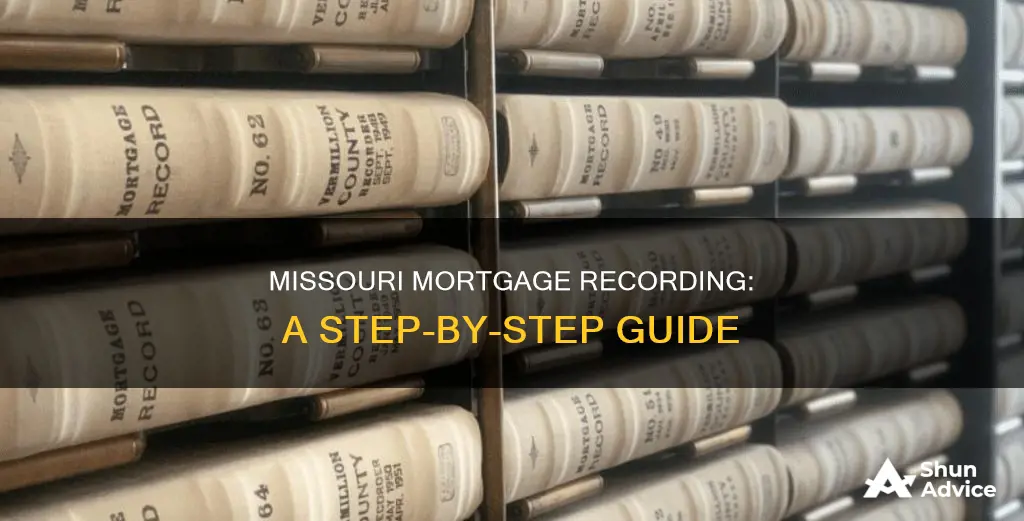
Recording a mortgage in Missouri involves filing your mortgage with your county. This establishes a chain of title and puts the public on notice that you own the property. It also helps resolve disputes between parties with competing claims to your property. There are several requirements for recording real estate documents in Missouri, including statutory recording fees, which vary depending on the nature and volume of the documents. It is important to meet these requirements to avoid issues with ownership disputes and to ensure a smooth process when obtaining a mortgage.
What You'll Learn

Recording a mortgage establishes a chain of title
Recording a mortgage is a crucial step in the home-buying process, and it establishes a chain of title by creating a public record of the transaction. In Missouri, as in other states, recording real estate documents is essential for several reasons. Firstly, it helps to establish a clear history of ownership, which can be referenced if any disputes arise. This is particularly important in cases where multiple parties may claim ownership, as the court can examine the chain of title to determine the rightful owner.
The process of recording a mortgage in Missouri involves submitting the relevant documents to the recorder's office in your county. These documents typically include the deed, mortgage, and any other pertinent real estate filings. It is important to note that certain standardisation requirements must be met for the documents to be recorded. For instance, the title and date of the document, as well as the grantor and grantee names, should appear on the first page. There may be additional requirements, such as presenting the original note or including specific details like the loan amount and trustee information.
Recording fees, which vary depending on the state and the nature of the documents, must also be paid. In Missouri, statutory recording fees apply to all real estate filings, and there may be additional charges for non-standard documents. While recording a mortgage may not seem like a significant step, it has important legal and financial implications. Failing to properly record these documents can lead to ownership disputes and make it challenging to obtain a mortgage in the future. Therefore, lenders typically withhold the go-ahead for handing over the keys until the recording process is complete.
Additionally, recording a mortgage serves as a form of protection for both the lender and the borrower. It puts the public on notice about the ownership of the property and any claims or liens against it. This includes voluntary liens, such as using the property as collateral for a loan, and involuntary liens, where another party puts a lien on the property due to unpaid debts. By recording the mortgage, the lender can secure their interest in the property, and the borrower can establish their rights as the owner. Overall, the process of recording a mortgage in Missouri helps to establish a clear chain of title, facilitate dispute resolution, and protect the interests of all parties involved.

Recording fees
Recording a mortgage in Missouri involves filing your deed and mortgage with your county. This process establishes a chain of title and makes the information available to the public. It is important to note that over 100 types of documents can be recorded, and the specific requirements may vary depending on the county or the nature and volume of the documents.
In terms of recording fees, these charges are applied to all real estate filings. The fees can vary depending on the state and the nature and volume of the documents. The national average for recording fees is $125, but they can range from zero in some states to percentages of the home price that can result in costs in the thousands. In addition, some states may combine real estate transfer taxes with recording fees, while others keep these charges separate.
When it comes to paying recording fees, this typically occurs at the closing of the transaction when you sign your final documents. It is important to ensure that all recordable documents are delivered to the recorder's office in your county, where an official such as a recorder of deeds or county clerk will handle the recording tasks.
It is worth noting that failing to properly record these documents can lead to issues such as ownership disputes and difficulties in obtaining future mortgages. Therefore, lenders usually do not provide the keys to a new home until the recording process is complete. In the event that a document does not meet the recording standards, it will be recorded as "non-standard", and an additional non-standard penalty fee of $25 may apply.

Requirements for recording real estate documents
To record a mortgage in Missouri, you must submit your documents to the Recorder of Deeds office. There are specific formatting requirements for recording real estate documents in Missouri. These requirements ensure that your documents are recorded accurately and efficiently. Here are the key requirements for recording real estate documents:
Document Formatting
- Paper size: 8.5 x 11 inches.
- Margins: The first page should have a 3-inch blank top margin and a 0.75-inch bottom and side margin. All other pages should have a minimum of 0.75-inch margins on all sides.
- Font size and colour: The text must be in a legible font and at least 8-point size. Use black or dark blue ink.
- Printing: Print or type on only one side of each page.
- Attachments: Do not staple or attach pages together, except as necessary to comply with statutes.
- Watermarks: Do not include any watermarks or visible inclusions.
Content Requirements
- Title and date: The title and date of the document must be on the first page.
- Grantor and Grantee information: Include the full legal names, addresses, and marital status of both the Grantor and the Grantee on the first page. All parties must sign the document, and their signatures must be notarized.
- Legal description: Provide a legal description of the property on the first page.
- Book and Page Numbers: If referring to any previously recorded document, state the book and page numbers or date and daily numbers of the cited document.
- Loan amount and Trustee: The loan amount and the Trustee's name are usually listed in the body of the document.
- Original Note and Deed of Trust: If the original deed of trust was recorded before January 1, 1986, you must present the Original Identified Note with the release deed. The book and page number of the deed of trust being released must be on the first page.
- Standard recording fees: Statutory recording fees will apply to all real estate filings.
Please note that these requirements may vary slightly depending on the specific county or city in Missouri. Always refer to the local government's website or the Missouri State Statutes for the most up-to-date and accurate information.

Title insurance for mortgages
The two primary types of title insurance policies in Missouri are the owner's policy and the mortgagee's or lender's policy. The owner's policy is designed to protect the property purchaser, while the mortgagee's policy safeguards the interests of the mortgage lender. Most financial institutions providing mortgages on a large scale will require a mortgagee title policy to secure their investment.
The owner's title insurance policy addresses various unknown title defects, including debt from previous work on the property, misinformation in deeds, undisclosed easements granting third parties partial land ownership, and unpaid mortgage bills resulting in liens. These issues can jeopardise the owner's peaceful enjoyment of the property and their full ownership rights.
In Missouri, the responsibility for paying for title insurance is determined by the purchase contract. If the buyer is responsible for the payment, they have the freedom to select their preferred title company. It is advisable for buyers to obtain both owner's and lender's title insurance policies to safeguard the financial interests of all involved parties. The cost of title insurance depends on the property's purchase price and the chosen title insurance provider.
The process of recording real estate documents in Missouri involves adhering to specific requirements and statutory recording fees. Documents must meet standardisation requirements, including the placement of a recording certificate in the top 3" margin of the first page. If a document is deemed "NON-STANDARD," an additional $25 penalty fee is incurred. The original deed of trust and its book and page number are also crucial elements in the recording process.

Liens and loan terms
Liens are claims against your property that can be made by various parties, and they can damage a property's reputation as they appear in property records. There are two main types of liens: voluntary and involuntary. Voluntary liens are those that you agree to when you borrow money and use your home as collateral. In this case, the lender will put a lien on the property until you pay off the loan. Mortgage liens are a type of voluntary lien. The lender will require monthly payments and put a lien on your deed until you pay off the loan. If you fail to make timely payments, the lien allows them to seize and sell your home in foreclosure to repay the debt.
Involuntary liens are more serious, as you have no choice in the matter. If you owe money and refuse to pay, the party can put a lien on the property and eventually foreclose and sell it. Mechanic's liens are a type of involuntary lien, where people who have done work on your property—such as contractors, labourers, or architects—can put a lien on the property until it sells, and they will be paid out of the proceeds. Tax liens are another type of involuntary lien. If you fail to pay your annual property taxes, the county can put a lien on your property, and if you continue to not pay, they will sell the property.
Loan terms are outlined in the loan document, which may indicate how much the borrower should repay based on the set interest rate and approved payment methods. It will also include the names and details of both the borrower and the lender, as well as the duration of the loan. Recording fees are charged when filing these documents, which vary depending on the state and the nature and volume of the documents.
Frequently asked questions
Recording a mortgage in Missouri means filing your deed and/or mortgage with your county. This establishes a chain of title and puts the public on notice that you own the property.
The recording fees charged depend on the nature and volume of the documents. The national average for recording fees is $125, but they can range from zero to percentages of the home price that can push costs into the thousands.
The requirements for recording a mortgage in Missouri include having the document dated and time-stamped, and in some cases, notarized. The document must also meet recording standards, which may include having the title and date on the first page, grantor and grantee names and marital status, and the loan amount and trustee listed.
Information about recording a mortgage in Missouri can be found on the county recorder's office website or the Secretary of State's website, which includes forms and instructions for real estate filings.







